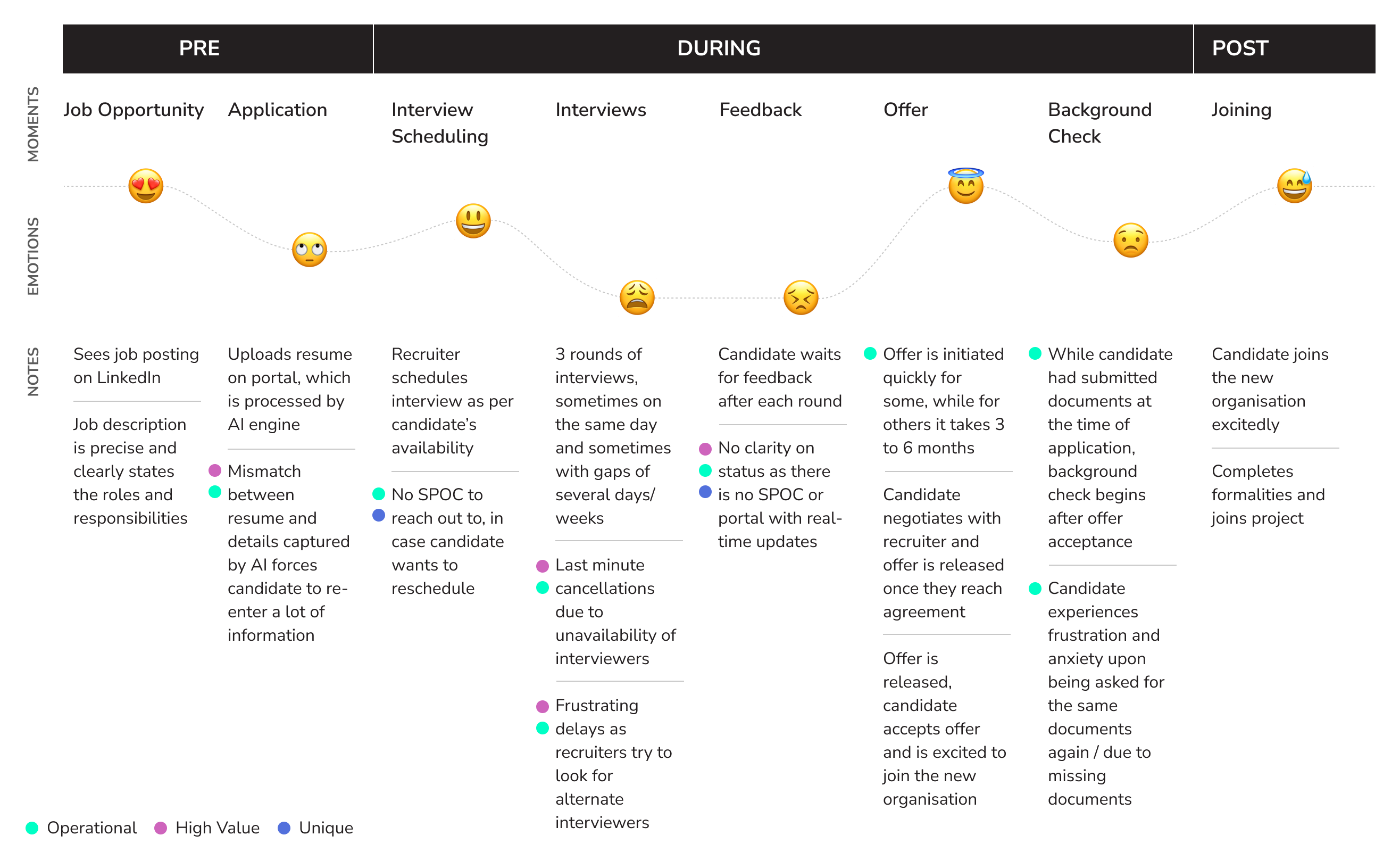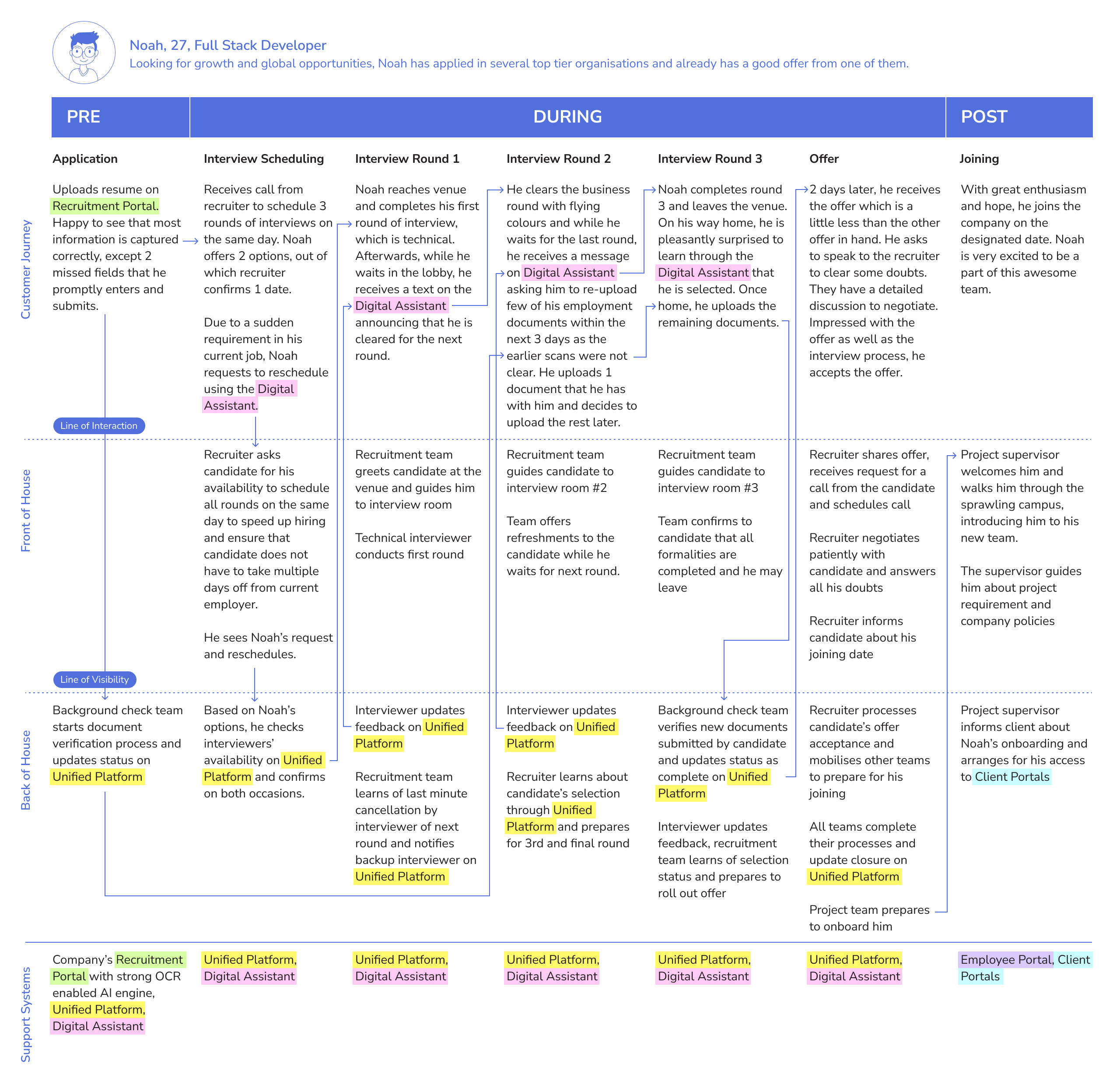Being a large, service-based company, hiring good talent and onboarding them efficiently into projects was critical to organisation success. Recruitment was a complex, ongoing activity with hundreds of new employees onboarded every month and several more interviewed. Naturally, this required systematic collaboration between several stakeholders, with a high potential for chaos.
We conducted Service Design for the organisation, starting with user research across different stakeholder groups, followed by co-innovation workshops and finally a service design blueprint with detailed steps to streamline the process. As project lead, I facilitated research, managed a team of 4 Service Designers and created the blueprint.
Disclaimer: While I have worked on similar projects, this is a fictional case study as I cannot share the insights and blueprints of a real project for confidentiality reasons. While I have created all artefacts from scratch, I have tried to keep them as close to real as possible, to explain how I lead a service design project.
“I want quality talent ASAP for my project”
No skilled talent on bench
Cumbersome process to hire external talent
Lack of skilled interviewers to interview candidates
“I want to close open positions for all projects within 20 days”
Candidate/Interviewer no shows for interviews
Pressure from projects and leadership to close targets
Missing documents for background check
Offer rejection by candidates right before joining date
“I want a great job so I can grow further in my career”
Lengthy application process
Took leave from current job for interview but it was cancelled at the last minute
Confused about selection status and next steps
“I want to finish the interview quickly and get back to my work”
Waste of time in case of skill mis-match
Gets force nominated sometimes, when on PTO or at client location
Tedious, complex feedback portal with technical issues
Everyone was overworked and doing their best, yet there were delays in hiring and people were unhappy. Candidates were frustrated with the long process that often ran into months, many giving up along the way and accepting offers from other companies. A Root Cause Analysis revealed that lack of integration between various teams was the primary reason for delays across the journey. Lack of real-time status updates led to delays in action, further leading to confusion and chaos.

Having identified moments that matter in the candidate’s journey map above, we brainstormed on ideas to improve the experience. Some moments had operational issues, some others had potential to create a unique experience, while some had potential to generate a high value experience. Presenting below top ideas for each of the 3 types of moments.
Candidate
On-demand status updates using a digital assistant to keep the candidate aware of progress and next steps, answer questions
Assured, taken care of
Candidates may be willing to wait a little longer for the next round if they know they are selected and how long they need to wait. With a complex, long process spanning several teams, it is reassuring to have someone to clear doubts with. It also gives them a sneak peak into the organisation’s culture and professionalism.
Ensure that good candidates don’t quit the recruitment journey because they’re confused about their status and have no-one to check with.
Recruiter, Project Manager, Interviewer, Background Check Team
Integration of inputs from all teams to keep everyone informed, reduce manual input and delays
Efficient, professional
In a large organisation with several participating teams, a lot of delays and frustration can be reduced through clear communication.
Interviewers not being able to view candidate’s skills in advance, inform that they will not be able to take interview, share timely feedback, inform candidate about selection/rejection.
Interviewer, Recruiter, Project Manager
Recognition to interviewers for participating in the recruitment drive, to increase motivation and reduce cancellations
Recognition, motivation, being valued
Interviewer no-shows are a major reason for candidate frustration. Motivating interviewers through rewards and recognition can help fix this gap.
Availability of interviewers to conduct all rounds of interviews in a day and improve speed of recruitment.
As a final step, we created a Service Design Blueprint with the proposed, seamless candidate experience. The existing journey was broken, with communication gaps between different stakeholders and teams. We mapped out Front of House and Back of House actions to segregate team responsibilities at each step. Interaction lines show the flow of information across the journey, between stakeholders and systems. For e.g. candidate uploads documents at step 1, which are reviewed Back of House. Communication about missing documents is shared at step 4 (could be at any other step as well), candidate uploads them at steps 4 & 5, which is reviewed again Back of House and marked as complete.
